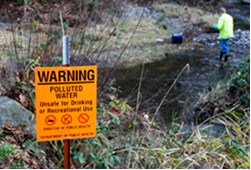
Public Information and Resources
![]()
![]()
![]()
![]()
![]()
![]()
![]()
![]()
![]()
![]()
![]()
![]()
![]()
![]()
The Green Country Stormwater Alliance (GCSA) is a coalition of Phase I and II stormwater permitted cities and counties in northern Oklahoma. Founded in 2005 by INCOG, GCSA Members represent about half of all municipal stormwater permittees in Oklahoma. Membership is voluntary, with annual dues supporting all of INCOG’s professional stormwater services.
This GCSA website provides stormwater information and resources for businesses and the general public, as well as technical resources for stormwater permittees. Contact information for individual GCSA Members is also provided, and you may contact INCOG’s stormwater staff at stormwater@incog.org or by phone (918) 579-9451.
FAST LINKS AND HELP:
• GCSA Internet Resources
• GCSA Education Materials
• GCSA Members
• OWS Great Plains Low Impact Development (LID)
• Central Oklahoma Storm Water Alliance (COSWA)
IMPORTANT FACTS
Water Quality, Not Flood Control – The EPA stormwater permit program is about controlling pollution, not about controlling flooding. Untreated Rainfall Runoff – In Oklahoma, stormwater runoff does not flow to pollution treatment systems, it flows untreated to streams, ponds, and lakes. Wide Spectrum of Urban Pollutants – Bacteria, sediment, nutrients, metals, pesticides and other toxics can be found in stormwater runoff. |
 |
 |
Permitting Authorities– The U.S. Environmental Protection Agency (EPA) delegated its stormwater permitting authority to the Oklahoma Department of Environmental Quality (ODEQ), but EPA continues to have final oversight. General Permits – ODEQ issues three types of stormwater general permits: OKR05 for industrial activities, OKR10 for construction activities, and OKR04 for small municipal stormwater permittees. Coverage under each is obtained by submitting an application called a Notice of Intent (NOI), and preparing a Stormwater Pollution Prevention Plan (SWP3) for OKR10 and OKR05 coverage, and a Stormwater Management Program (SWMP) document for OKR04 coverage. Large cities (Tulsa and Oklahoma City) are permitted under individual permits. Permitting Authorities– The U.S. Environmental Protection Agency (EPA) delegated its stormwater permitting authority to the Oklahoma Department of Environmental Quality (ODEQ), but EPA continues to have final oversight. |
General Permits – ODEQ issues three types of stormwater general permits:
- OKR05 for industrial activities,
- OKR10 for construction activities, and
- OKR04 for small municipal stormwater permittees.
Coverage under each permit is obtained by submitting an application called a Notice of Intent (NOI), and preparing a Stormwater Pollution Prevention Plan (SWP3) for OKR10 and OKR05 coverage, and a Stormwater Management Program (SWMP) document for OKR04 coverage. Large cities (Tulsa and Oklahoma City) are permitted under individual permits.
Important Acronyms
MS4 “Municipal Separate Storm Sewer System” is the city or county owned stormwater collection system that includes streets, gutters and ditches.
BMP “Best Management Practice” is an action or structure used to help reduce stormwater pollution. Nonstructural BMPs include public education events, volunteer monitoring, and performing inspections.
LID “Low Impact Development” is an action or structure that reduces the amount of rainfall runoff and pollutants. LID examples are rain gardens and sidewalks made with pervious concrete.
STORMWATER POLLUTION BASICS
How can rain cause pollution? Many people assume that rainfall runoff goes from the storm drains into some type of waste treatment system. Not so! Pollutants in runoff end up untreated in local creeks, ponds and lakes. LEARN MORE
What Are Phase I and II Permits? Phase I rules addressed large cities (Tulsa and Oklahoma City) and 11 categories of "industrial activities" considered to be significant stormwater pollution sources, including construction. The 1999 Phase II rules addressed many smaller cities. In Oklahoma, the Phase I industrial activities are covered under the OKR05 general permit, and construction activities are covered under OKR10.
Water Quality Impairment – Section 303(d) of the Clean Water Act requires states to develop a list of impaired waterbodies every two years (biennially). The latest 303(d) List approved by EPA is available online at this DEQ website.
Five-Year Permit Cycles for Stormwater General Permits – Each of the 3 stormwater general permits in Oklahoma have a 5-year cycle. About 18 months before the permit expiration date, DEQ begins a reauthorization process that updates permit content to meet existing EPA requirements and add improvements. If a general permit expires before getting reauthorized, existing permittees continue to operate under the expired permit until the reauthorization process is completed. DEQ publishes copies of its stormwater general permits on their DEQ stormwater website. Assuming no delays in future reauthorizations, the latest and projected years of reauthorizations are:
- OKR04: 2015, 2020, 2025
- OKR05: 2017, 2022, 2027
- OKR10: 2017, 2022, 2027
